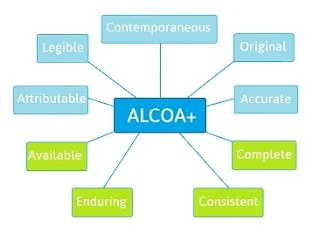The term ALCOA is an Acronym, which stands for Attributable, Legible, Contemporaneous, Original and Accurate. ALCOA was then expanded to ALCOA Plus (ALCOA+), by the addition of a few more concepts which are; Complete, Consistent, Enduring and Available.
Principles of ALCOA & ALCOA+
In order to understand the concept better, below we will break down ALCOA Plus and define each part of the acronym:1. Attributable
Attributable dictates that any data should be easily identified to the person who did the data collection, place of origin and the time of data collection should also be noted down. in the case of alteration of data, the person making the corrections should also be noted down.2. Legible
Legible data means the data can be easily read. This attribute should be ensured both in the short and long term, therefore the materials used in recording and collecting the data should be durable.3. Contemporaneous
Data recorded should be contemporary in nature. This dictates that the time of data collection should correspond accurately with the time of data recording. Any data collection should have a date and time, and the same should be ensured in the case of any later corrections.4. Original
In order to preserve the meaning and integrity of data, the original records should be preserved, meaning the material used should be durable. in the case of duplicates, the creator of the original records should confirm the authenticity of the copies.5. Accurate
For any data to be viable, it should be error free. In the case of any amendments, there should be accompanying documents to support the changes. The data should be complete and viable. Data quality must be maintained.6. Complete
When data is complete in nature, it means there is no deletion that has taken place from the date of the documentation. This includes any changes that have been made during the life of the data.7. Consistent
The data should be chronologically arranged, with time stamps included for any addition to the original data. Consistency should be ensured by applying various audits over the life of the data.8. Enduring
The material used to record the data should be in a manner that will last a long duration of time without losing the readability.9. Available
Data should be accessible whenever needed, over the life of the data. Availability ensures the data meets it's use, since it can be applied when the need arises.Frequently Asked Questions on ALCOA and ALCOA+
Q: What does ALCOA stand for?
The meaning of ALCOA is Attributable, Legible, Contemporaneous, Original, and Accurate.Q: What is the purpose of ALCOA principles?
ALCOA principles are used to ensure data integrity in pharmaceuticals and other industries. It ensures the reliability and authenticity of the data.
Q: What does each component of ALCOA mean?
Each component of ALCOA is explained above.
Q: What is ALCOA+?
ALCOA+ is the extended form of ALCOA to further enhancement of data integrity.
Q: What does ALCOA+ stand for?
The full form of ALCOA + is Attributable, Legible, Contemporaneous, Original, Accurate, Complete, Consistent, Enduring, and Available. The last four principles are added to ALCOA to enhance the efficiency of ALCOA.
Q: What are the additional attributes of ALCOA+?
Complete, Consistent, Enduring, and Available are additional attributes that are explained above in detail.
Q: Why are ALCOA and ALCOA+ important in data integrity?
ALCOA and ALCOA+ are important to ensure data integrity in pharma and other industries. Data integrity maintenance is a mandatory requirement of regulatory agencies to produce reliable products.
Q: How are ALCOA and ALCOA+ applied in practice?
ALCOA and ALCOA+ principles are implemented through good documentation practices in quality control and manufacturing documentation. A data management system is established in companies, conduct regular internal audits and employees are trained in good documentation practices to achieve the goal of ALCOA and ALCOA+.
Q: Are ALCOA and ALCOA+ specific to any industry?
ALCOA principles originated in the pharmaceutical industry but these principles are also adopted by other regulated industries like healthcare, biotechnology, food and beverage industries.
Q: How do regulatory authorities address ALCOA and ALCOA+ principles?
Regulatory agencies like FDA and EMA expect the implementation of ALCOA principles. Companies failed to implement these principles may lead to strict regulatory actions including warning letters and product recalls.



very informative and updated literature.
ReplyDeleteNice Sir
ReplyDeleteGreat and Useful informative.
ReplyDeleteThis is very much appreciable, as many of the companies in india were receiving warning letters from FDA due to lack of implementation of ALCOA.
ReplyDeleteBest Regards,
AJAY K
Great and very impotant information.
DeleteThis information is very useful and required to improve data integrity issues which is presently most common for every industries.
ReplyDeleteThanks for sharing most informative information.
Information provided was awesome that anyone can take the topics as an aid to build a quality document in any stream. Thank you pharma guidelines for being the pharma expert and helping achieve perfection in documentation.
ReplyDeletenice
ReplyDeleteVery nice and useful information about data integrity.
ReplyDeleteIn last question, last line earning latters instead of warning letters.
ReplyDeleteupdated
Deletethanks of cooperation